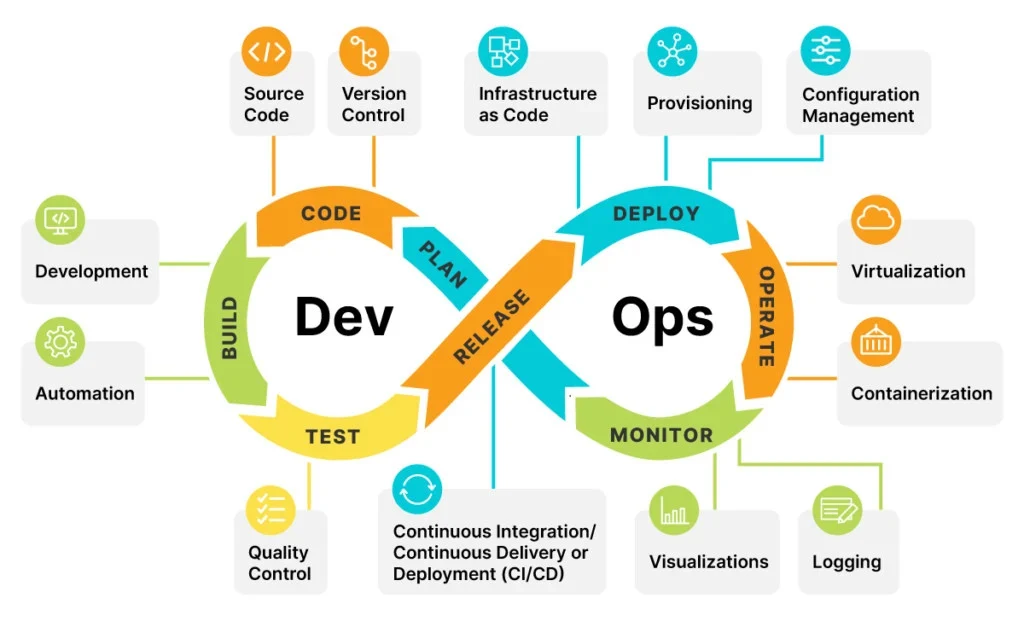Decoding the Future of DevOps: Essential Skills and Innovations
Decoding the Future of DevOps, Essential Skills and Innovations, Advanced DevOps techniques have become an invaluable asset to meet the challenges associated with modern software creation and distribution. Reasons To Learn DevOps in 2024 DevOps has a great and promising future. The practical applications of DevOps, engineers are increasingly seen as key figures in shaping the future of technology within organizations.
Infrastructure as Code (IaC)
IaC allows you to manage infrastructure using code, providing revision control and repeatable deployments that can be repeated with repeatable ease. DevOps consultants should have knowledge of IaC tools such as Terraform and Ansible in order to master IaC solutions properly. Monitoring and Observability,
Monitoring is the key to identifying problems and optimizing performance, making DevOps professionals essential in implementing monitoring solutions and using observability tools for profound insight. Site Reliability Engineering (SRE)
SRE principles center around stability, scalability and performance – qualities which DevOps consultants with knowledge in SRE can contribute to building robust systems while increasing application performance overall.
Microservices Architecture
Microservice-based architectures enable greater flexibility and scalability of applications, offering DevOps professionals more opportunities for greater agility in application creation and deployment. DevOps professionals must understand both advantages and challenges associated with managing microservices infrastructures.
AI Integration in DevOps
The synergy between Artificial Intelligence (AI) and DevOps is gaining prominence. DevOps consultants should explore the potential of AI in automating decision-making processes, predictive analytics for issue resolution, and optimizing resource allocation. AI-driven insights can enhance the efficiency of DevOps workflows, providing a competitive edge.
Serverless Computing Paradigm
The rise of serverless architecture introduces a paradigm shift in how applications are developed and deployed. DevOps consultants must delve into serverless computing, understanding its implications for scalability, cost-effectiveness, and streamlined deployment models.
Edge Computing Integration
As edge computing becomes integral, DevOps professionals should explore how it impacts deployment strategies. Understanding the nuances of deploying and managing applications at the edge is crucial, especially in scenarios with low-latency requirements.
Automated Testing with AI/ML
Beyond conventional testing methods, DevOps consultants can leverage AI and Machine Learning (ML) for automated testing. AI-powered testing tools can intelligently identify patterns, predict potential issues, and contribute to faster and more reliable software releases.
ChatOps and Collaboration Tools
Collaboration is a key aspect of DevOps success. DevOps consultants should explore ChatOps, integrating communication and collaboration directly into the workflow. Utilizing collaboration tools that enhance real-time communication can foster quicker decision-making and issue resolution.
Shift-Left Security Practices
DevOps security is evolving towards a “shift-left” approach, emphasizing the integration of security measures earlier in the development cycle. DevOps consultants should be well-versed in implementing security practices from the inception of a project, ensuring a proactive and robust security posture.
Container Security Solutions
With the widespread adoption of containerization, ensuring container security is paramount. DevOps consultants need to explore advanced container security solutions, understanding how to protect containers throughout their lifecycle.
DevOps for Data Science
The intersection of DevOps and Data Science is an emerging frontier. DevOps consultants should explore how to integrate data science workflows into the DevOps pipeline, facilitating seamless collaboration between data scientists and development teams.
Quantum Computing Considerations
While still in its infancy, quantum computing holds the potential to revolutionize computational capabilities. DevOps consultants should stay informed about developments in quantum computing and consider its potential impact on future DevOps practices.
Cross-Platform and Cross-Language Compatibility
DevOps consultants should focus on ensuring compatibility across diverse platforms and programming languages. Understanding how to orchestrate workflows in heterogeneous environments ensures a smooth integration of different technologies within the DevOps pipeline.
Compliance as Code
As regulatory requirements evolve, DevOps consultant should explore Compliance as Code (CaC) practices. This involves codifying compliance requirements, ensuring that regulatory standards are met consistently throughout the software development lifecycle.
Decentralized Version Control Systems
Exploring decentralized version control systems, such as Git, beyond their basics can enhance collaboration and versioning control in DevOps. DevOps consultants should delve into advanced Git features for optimized version management.
As DevOps continues to evolve, embracing these emerging technologies will empower consultants to navigate the complexities of modern software delivery and maintain a competitive edge in the rapidly changing technological landscap
Blockchain in DevOps
Blockchain technology is increasingly being leveraged to enhance security and transparency within DevOps processes, but understanding how blockchain integrates into DevOps workflows remains key to its use effectively.
Kubernetes Orchestration
Kubernetes is quickly becoming the go-to tool for orchestrating containerized applications at massive scale, so DevOps consultants require mastery of Kubernetes for managing it effectively. Industry Considerations 2.1
Different industries present different problems, so DevOps consultants need to customize their methods according to each of their client’s individual requirements.
Healthcare Compliance
When it comes to healthcare compliance requirements like HIPAA, DevOps consultants need to navigate a maze of requirements effectively. Financial Services Resilience
Implementing DevOps techniques within the financial industry requires special consideration for resilience and disaster recovery in order to guarantee continuous availability of services.
Hybrid and Multi-Cloud Environments Deploying DevOps
DevOps will likely become increasingly important as cloud applications expand across multiple environments
Hybrid Cloud Strategies
DevOps professionals must be adept in devising hybrid cloud strategies that effectively merge physical infrastructure on-premise with private and public cloud resources, and vice versa.
Multi-Cloud Management
Effective management of applications within a multi-cloud environment demands
comprehensive knowledge of cloud providers and effective use of resources.
Challenges and Opportunities
DevOps consultants often encounter barriers on their path towards innovation. Addressing security concerns, cultivating an environment of continuous learning, and breaking through resistance are crucial aspects of DevOps changes being successful.
Continuous Learning and Community Engagement Staying current in DevOps requires continuous learning and community engagement to remain competitive in an ever-evolving industry. Consultants should engage with industry groups as well as attend industry conferences or take part in continuing education programs in order to remain ahead of technology advancements.
More:
Most Searched Educational Topics on Youtube
Final Thoughts
DevOps is an ongoing journey with constant evolution. DevOps consultants possess an array of skills and an in-depth knowledge of new technologies that allow them to guide companies to greater efficiency, creativity, and dependability than ever before. As DevOps advances further into its future it becomes ever more essential that consultants play a pivotal role in shaping its direction.





